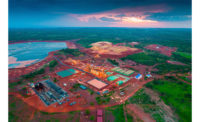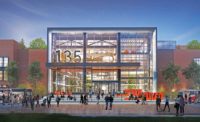"The energy business has fueled a lot of that growth," says Jim Furr, regional managing principal at Gensler. "We've worked for both the big energy companies and the independent producers."
Most notably, Gensler is the architect of record on the new ExxonMobil campus being built on a 385-acre site north of Houston. It will include multiple low-rise office buildings, a laboratory, conference and training centers and other facilities such as childcare and a wellness center.
But Furr says the "ripple effect" is equally important. Gensler, which employs more than 3,400 employees worldwide, works regularly with clients based in other regions who want to establish or expand offices in the vibrant Houston market.
And visitors are adding to the demand. "Houston just finished hosting the Offshore Technology Conference [in May], which drew about 70,000 people," he says. "That's the kind of activity that grows business."
Good Health
Health-care projects continue to be a steady source of revenue in an uneasy market for many top firms. The $1.2-billion Parkland Hospital project in Dallas, which broke ground last year, provided a big boost to the design team led by HDR and Corgan Associates. HDR also designed the $420-million Wilford Hall Ambulatory Care Surgical Center at Lackland Air Force Base. Blitch Knevel Architects, New Orleans, was part of the design team on the $1.1-billion University Medical Center under way in New Orleans. The Dallas office of Perkins+Will designed a $700-million expansion and renovation of University Hospital in San Antonio for University Health System.
Health-care projects for the U.S. Dept of Defense and the U.S. Dept of Veterans Affairs also added to billings in 2011. PageSoutherlandPage designed the $82-million Dept. of Veterans Affairs Outpatient Clinic in Austin, which broke ground last year.
Health-care work was a big part of HKS's strategic plan to weather the recession, says Ralph Hawkins, its CEO. "Health care has always been strong for us, but we saw opportunities in military health care and specific types of health care projects like pediatrics and women's care," he says. "Those didn't seem to be strongly impacted by the recession."
Among the firm's biggest wins was the $534-million Carl R. Darnall Army Medical Center project in Kileen, Texas, where it led the design team in a partnership with Wingler & Sharp, Wichita Falls, Texas.
HKS Sports & Entertainment Group has seen surprising success during the recession, focusing on higher education clients. It designed the Apogee Stadium at the University of North Texas in Denton, which was certified as the first newly constructed LEED Platinum collegiate football stadium in the nation.








